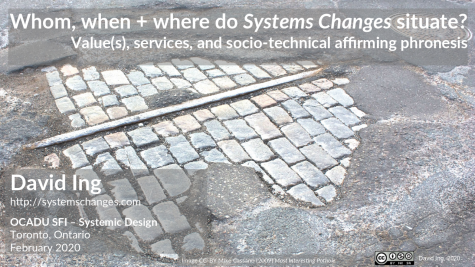The “Understanding Systems” SFIN-6011 course is a requirement in the master’s program in Strategic Foresight and Innovation at OCADU. For winter 2025, the class is now led by Stephen Davies, breaking the incremental evolving of content since 2008. While still on faculty at OCADU, the original course designer Peter H. Jones is now a Distinguished University Professor at Tecnologico de Monterrey, spending more time in Mexico City than Toronto. In the fall, Stephen and I discussed ways that the legacy course might be updated, since the field of systemic design has emerged and matured over 15+ years. I was one of the instructors with Peter of SFIN-6011 in winter 2020, and have prior experiences of writing systems thinking courses in 2018 for the UToronto iSchool, and at Aalto U. in 2016, in 2011, and in 2010.
From week 3 on, groups of students will lead short presentations on some systems approaches (e.g. system dynamics, soft systems methodology, viable system model). With short lead times to prepare literature reviews, the primary class activity for these master’s students is the facilitation of peer discussions that will surface key ideas. They aren’t expected to become experts on these topics at this point. They can get a sense of when and where a specific systems approach might be prioritized as useful, or deselected in favour of alternatives. After the presentation leaders have concluded with their slides, the instructors can fill in a few blanks.… Read more (in a new tab)
The “Understanding Systems” SFIN-6011 course is a requirement in the master’s program in Strategic Foresight and Innovation at OCADU. For winter 2025, the class is now led by Stephen Davies, breaking the incremental evolving of content since 2008. While still on faculty at OCADU, the original course designer Peter H. Jones is now a Distinguished University Professor at Tecnologico de Monterrey, spending more time in Mexico City than Toronto. In the fall, Stephen and I discussed ways that the legacy course might be updated, since the field of systemic design has emerged and matured over 15+ years. I was one of the instructors with Peter of SFIN-6011 in winter 2020, and have prior experiences of writing systems thinking courses in 2018 for the UToronto iSchool, and at Aalto U. in 2016, in 2011, and in 2010.
From week 3 on, groups of students will lead short presentations on some systems approaches (e.g. system dynamics, soft systems methodology, viable system model). With short lead times to prepare literature reviews, the primary class activity for these master’s students is the facilitation of peer discussions that will surface key ideas. They aren’t expected to become experts on these topics at this point. They can get a sense of when and where a specific systems approach might be prioritized as useful, or deselected in favour of alternatives. After the presentation leaders have concluded with their slides, the instructors can fill in a few blanks.… Read more (in a new tab)



